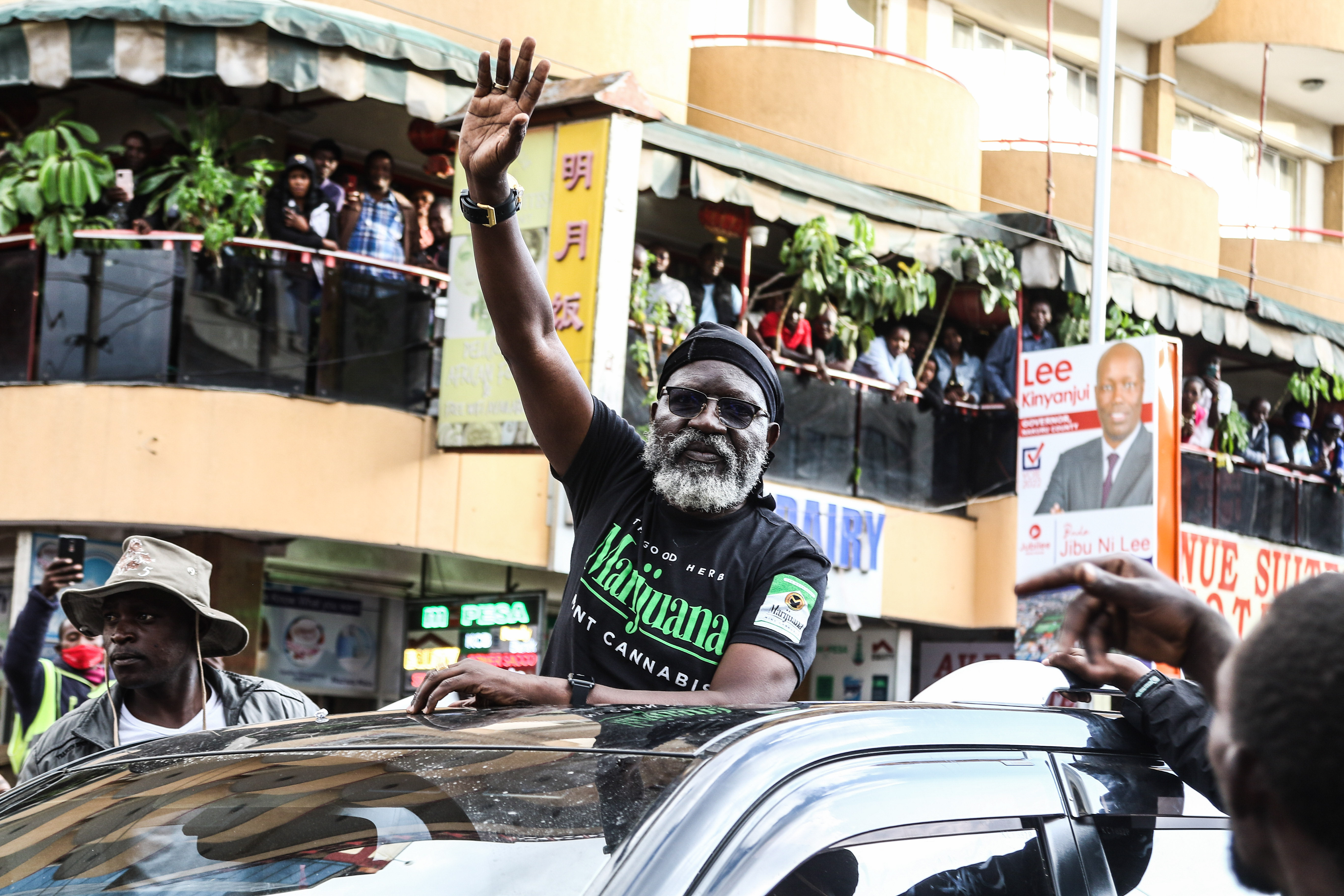Kenia
Outsider shakes up Kenya's election campaign: Why is the exotic Wajackoyah doing so well?

George Wajackoyah
© picture alliance / ZUMAPRESS.com | James WakibiaNairobi, 4 August 2022 - George Wajackoyah is an enigmatic personality in many respects: former street child, taken in by the Hare Krishna, financed his studies as a night watchman and gravedigger, law professor with at least 16 university degrees and currently a presidential candidate in Kenya.
Wajackoyah's appearance alone - shaggy grey beard, T-shirt and headscarf - is provocative, but his manifesto are even more so. Part of his aspirations for Kenya if elected in office is to pay off the country's high debts by exporting marijuana and snake venom. The sale of hyena testicles to China as a medicine also forms part of his agenda.
With these messages, Wajackoyah has been the talk of the town in Kenya for weeks. Almost out of nowhere, he has climbed to third place in the polls - election researchers believe he can get up to four percent of the votes on August 9th with some even predicting seven percent for him.
Why the exotic candidate is so well received? The fact that his main demand - the legalisation of marijuana - is popular with young people is not enough of an explanation. Wajackoyah's success highlights the dilemma facing Kenyan voters. The two main rivals for the presidency belong to the political establishment, both have held top positions in the state for years and there are allegations of corruption against both. Neither of them stands for a courageous departure, which Kenya so urgently needs and yearn for.
The struggle of these "hustlers" against the "dynasties"
On one hand, there is the current Deputy President William Ruto, the candidate of the Kenya Kwanza - Kenya first coalition. Ruto helped the current president, Uhuru Kenyatta into office ten years ago, who was supposed to support him in return now, however, Kenyatta reneged on that deal back in 2018, allying himself with his long-time rival Raila Odinga in a so-called "handshake".
William Ruto's election campaign focuses on the marginalised in Kenyan society, the millions who eke out a living as small traders, artisans or farmers. The struggle of these "hustlers" against the "dynasties", the influential families who have often acquired large estates and fortunes through fraud and corruption, is Ruto's main election campaign theme. Yet the 55-year-old himself became rich during his time as a politician and has been implicated in several scandals involving illegal land acquisition.
The main opponent Raila Odinga of Azimio La Umoja – Covenant of Unity. He is the scion of one of the most influential families in the country; his father was Kenya's first vice-president after independence. He too has been involved in various scandals. The 78-year-old Odinga is making his fifth attempt at the presidency. He has failed four times so far, in 2017, by his own admission, only due to electoral fraud by Uhuru Kenyatta. Nevertheless, since the handshake, this accusation seems to have been put aside with Kenyatta now on Odinga's camp.
For a long time, it seemed as if the younger and rhetorically gifted Ruto would win the race. For months, he led the polls. Then, in May this year, Odinga announced his running mate for vice president: Martha Karua, a lawyer, human rights activist and former justice minister under President Kibaki. "The only man" in the cabinet, as many Kenyans say to this day. Martha Karua would be the first woman to hold the office of vice president; she stands for straightforwardness and reforms. Accordingly, she is attractive to female voters and the well-educated middle class in the big cities. Since she came on board, Odinga has been leading in the polls, albeit narrowly.
Not to forget: Karua is a member of the most populous ethnic group in Kenya, the Kikuyu. Is that reason enough to pull Kikuyu voters to the side of Odinga's Azimio La Umoja? That is one of the central questions in this election. Odinga himself is Luo. Vice President Ruto is a Kalenjin. The outbreaks of violence in the past were mostly Kikuyus fighting with Luo or Kalenjin. In 2007, about 1000 people were killed and 250,000 displaced. According to observers, these experiences have not been forgotten. It is difficult to say whether the Kikuyus are more likely to vote for Luo Odinga or Kalenjin Ruto this time.
Chances for a peaceful election?
There is again a risk of violence after these elections especially between the supporters of the two main opponents and between their tribes – Kalenjin and Kikuyus. The police are already massing their forces in the Rift Valley, the area where most of the six million Kalenjin live.
Much will depend on whether the elections will be credible, free and fair. There have always been problems with this in the past. If this can be avoided this time, and there is a clear winner, Kenya has a good chance of conducting a peaceful election. On the other hand, the situation can become critical if the result is close, if there are allegations of manipulation or if it takes a very long time to determine the winner of the election.
This is where George Wajackoyah comes into play again. His surprising rise makes it unlikely that Ruto or Odinga will get over 50 per cent of the vote in the first round. The country then faces a second round of voting - and more weeks of uncertainty.
Stefan Schott is Head of the Friedrich Naumann Foundation for Freedom in East Africa and of the Global Partnership Hub based in Nairobi.
